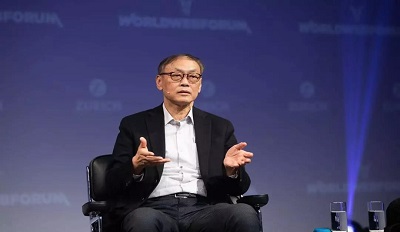
许多人以为 “无限的游戏” 代表将业务边界无限引伸,亦即无序的多元化。其实 “有限的游戏” 是指在特定的时空里,界定好的游戏规则下进行竞争,首要的目标是要打败对手。”无限的游戏” 的时空却可特定或不特定、游戏规则可特定亦可不特定、边界可特定亦可不特定。目的不一定是要打败对手,更是要追求更高的理想,超越简单物理的目标。懂得怎样玩无限的游戏的企业领导者是真正的智者、艺术家。


许多人以为 “无限的游戏” 代表将业务边界无限引伸,亦即无序的多元化。其实 “有限的游戏” 是指在特定的时空里,界定好的游戏规则下进行竞争,首要的目标是要打败对手。”无限的游戏” 的时空却可特定或不特定、游戏规则可特定亦可不特定、边界可特定亦可不特定。目的不一定是要打败对手,更是要追求更高的理想,超越简单物理的目标。懂得怎样玩无限的游戏的企业领导者是真正的智者、艺术家。

Originally published in South China Morning Post with title, “Why the US Should Not Try to Thwart China’s Blockchain and Digital Currency Ambitions.” All rights reserved.
In the October 23 Congress hearing on Facebook’s digital currency Libra, Mark Zuckerberg, the founder and CEO of the social media giant, warned Washington that blocking Libra would give way to China’s growing technological supremacy, which would eventually jeopardise America’s democratic values.
Zuckerberg’s remarks, though somewhat apocalyptic, fit into the rhetorical framework of the battle for technological leadership between the world’s two largest economies, the United States and China. Identified by the Trump administration as a revisionist power and strategic threat, China has been at the forefront of tech-enabled innovations, such as digital currency, since 2014.
During a meeting last month, President Xi Jinping endorsed blockchain as the nation’s core technology. China’s plan to launch a sovereign digital currency is also triggering new appetites for start-ups, traders, investors and researchers.
As the underlying technology of digital currencies such as bitcoin and Libra, blockchain is a distributed, decentralised and public digital ledger system which allows information and data to be immutably stored and transparent to all. The technology promises unparalleled efficiency, security and transparency and carries profound implications in a variety of scenarios from finance to manufacturing and energy.
In the finance sector, for example, blockchain can help traditional banks reduce operation costs, allowing individuals to perform transactions in a secure environment. The technology is also set to be involved in the development of smart, digitally connected cities. Blockchain-enabled parking platforms, for instance, would provide real-time information on parking spaces for drivers to reserve spaces, thus reducing congestion and on-street parking.
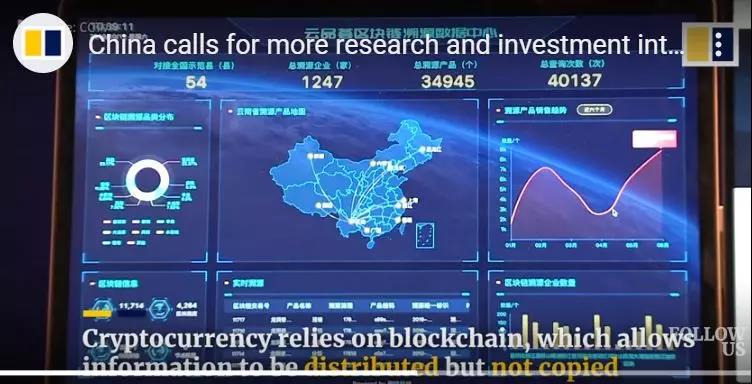
Source: SCMP
In the private sectors, demand for blockchain solutions for supply chain and logistics is quickly expanding. In a traditional supply chain, payments can take up to days, and contractual agreements involve different layers of third-party costs; the increasing globalisation and complexity of trade makes it almost impossible to trace products back to the source, compromising supply-chain integrity.
According to PwC, 40 per cent of food companies find food fraud difficult to detect with current methods, and 39 per cent believe their products are easy to counterfeit. Blockchain could be the answer to such supply-chain frictions.
China’s three-layered development model has lent resilience to its development. The central government sets the overarching strategy of developing a technologically advanced, innovative society while thriving entrepreneurial, private-sector companies drive business innovations, with local governments in the middle as liaisons. Guangzhou’s Huangpu Development district authorities, for instance, recently published regulations on blockchain use to cater for a major increase in applications, while a blockchain platform was launched last year in Shenzhen to serve the Guangdong-Hong Kong-Macau Greater Bay Area.
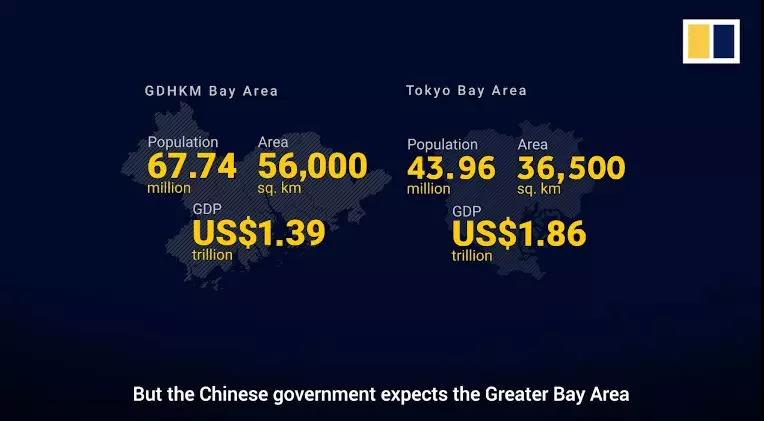
Source: SCMP
The US, meanwhile, is unsettled by China’s rapid expansion into the frontier technologies. President Donald Trump is set to help the US solidify, or regain, its position as a global innovation hub, despite his complicated love-hate relationship with the tech industry. In February, Trump signed an executive order to maintain America’s leadership in artificial intelligence. Last month, the White House revived the President’s Council of Advisors on Science and Technology, a group of experts who work to inform public policy on science, technology, education and homeland security.
The private sector is an important source of innovation in the US, as epitomised by Google’s milestone achievement in quantum computing – a technology that will produce a strong symbiosis with artificial intelligence and cryptography.
The de facto punchline of Trump’s tech move, though, was to cut Chinese companies off America’s technology value chain, especially the core scientific know-how. Over the course of the year, Washington repeatedly put pressure on Chinese telecom equipment and smartphone maker Huawei and blacklisted it, citing the company’s alleged coziness with the Chinese government, while reining back China’s dominance in 5G technology. Another 28 Chinese companies were later added to the blacklist, including the supercomputer maker Sugon along with three of its microchip subsidiaries.
Given the intensity and speed at which the rivalry is escalating, Zuckerberg’s warning is not totally unjustified. If China’s digital currency is adopted in more countries, America’s oversight and regulation of the global financial system will become challenging. This gap will only increase as the two countries diverge further into separate trajectories of the technology.
Hostile competition is likely to result in a zero-sum game. Continued blacklisting will do more harm than good, wreaking havoc on jobs and disrupting the global technology supply chain. As China develops applications of blockchain system, it should adopt best practices and international benchmarks, and establish a clearer, full-bodied legislative framework.
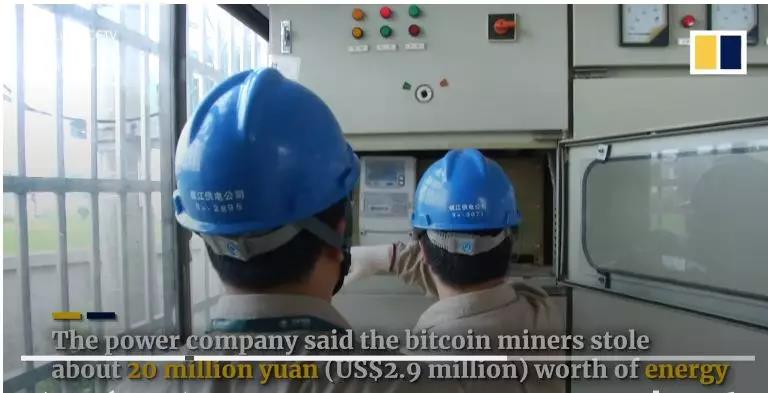
Source: SCMP
Though differences exist, and will continue to exist, the world will benefit if the two leading economic powers can seek commonalities, rebuild trust, cooperate on technological initiatives, and establish global governance and a code of conduct on blockchain technology as well as its applications. After all, increasingly, the issues facing humanity transcend national borders and require big powers to work together.
On the business level, such collaborations are already happening. For instance, IBM, Walmart, Chinese retailer JD.com and Tsinghua University launched a project in December 2017 to develop food safety solutions using IBM’s blockchain platform. The project also involved major food suppliers such as Dole and Kroger, benefiting offline and online consumers across the globe.
On a global level, blockchain’s potential trade-related applications could transform various aspects of international trade, including finance, customs and certification processes, logistics, and intellectual property. But for the technology to empower global growth, countries would have to cooperate with one another.
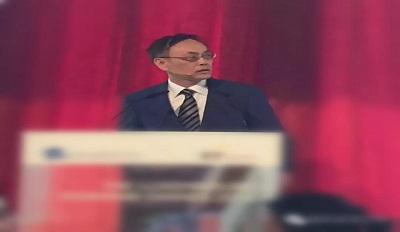
真正优秀的咨询顾问是社会中精英的精英,是 1%。这1%代表能力、视野、学问和态度。但他却属于社会的99% 的。优秀顾问不能 “离地”。必须与社会融合,通过工作特别是思想领导力和对客户的亲和力,为 99% 增值。
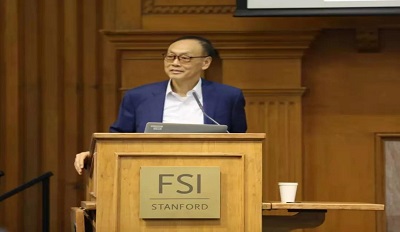
出色的战略咨询顾问一定是思想领导者 (thought leaders)。 关键词是思想。思想是如何建立起来的?它是透过长时间对周围的事物作出观察、分析而出来的,没有任何捷径。通过第一原则的分析,了解事物的本质,而不人云亦云。同时透过适当的分析框架和架构将众多的信息点系统性地整合到面上,甚至立体或超立体。本来貌似无序的数据突然好像变成有序了。如果你能持续地做到这样,恭喜你!That’s thought leadership!
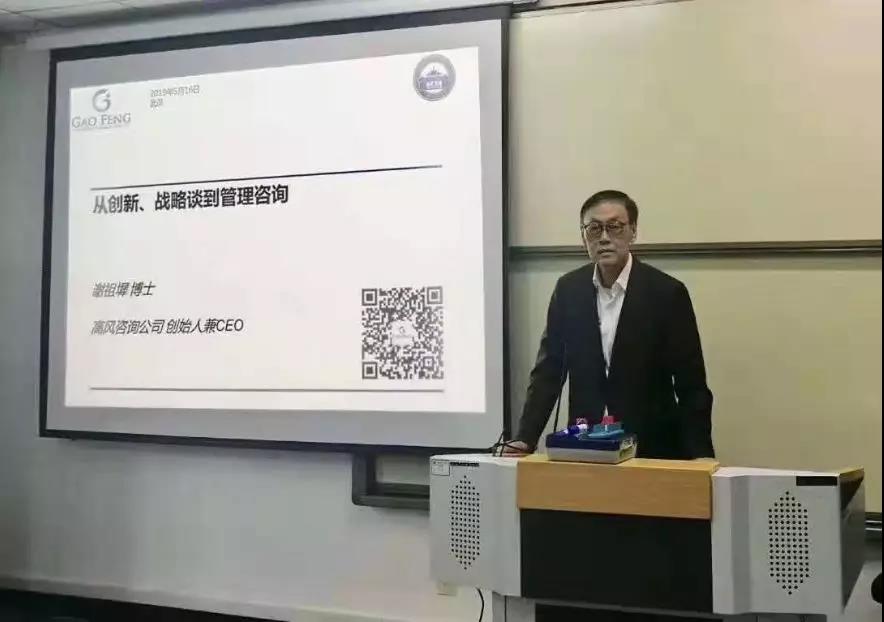
高端咨询除了是一个学习如何建立专业态度和精神的地方之外,它亦是给予个人在能力方面进行修练的地方。不单只是知识而已,更重要是培养如何在高度不确定、快速变化、模棱两可的情况中能够解决难题。这种能力只是可意味,而不能写在任何天书里的。但当你体会到你本来面向无名的恐惧感有一天你发觉已经具有足够信心可以克服了,你已经在高端咨询工作里取得了金矿。你已是富者。

The NBA and Apple Cases Show Foreign Businesses Need to Better Understand China, and Its Boundaries
By Edward Tse
October 21, 2019
Original published by South China Morning Post titled The NBA and Apple Cases Show Foreign Businesses Need to Better Understand China, and Its Boundaries on October 21, 2019. All rights reserved.
Gao Feng Advisory’s CEO Dr. Edward Tse’s latest op-ed was published on SCMP. In this article, Dr. Tse pointed out all countries have their own “boundary of sensitivities”, and foreign companies doing business should be mindful of the host country’s boundary. This applies to the recent cases of the NBA and Apple in China and will also apply to Chinese companies as they expand overseas.
The months-long protests in Hong Kong have not only attracted international attention, but have also begun to involve major foreign powerhouses like the NBA and Apple. The fallout caused by Houston Rockets general manager Daryl Morey’s tweet led Tencent and China’s predominant broadcaster CCTV to suspend the airing of NBA games, and Chinese companies such as Ctrip.com (China’s major travel booking platform) to terminate NBA sponsorship.
Meanwhile, Apple’s approval of an app which allows users to track protest activities received an immense backlash from the Chinese government and consumers. Apple has since removed it and released a statement that the app “violate[d] our guidelines and local laws”.
Some critics were quick to jump to the conclusion that China is victimising foreign companies and preventing freedom of expression. However, as in every country, China has certain boundaries of sensitivity.
Issues such as racial discrimination are highly sensitive in the US. In 2014, Donald Sterling (the former LA Clippers owner) was fined US$2.5 million and banned from the NBA for life because of his racist remarks. The NBA reacted to the unacceptability of these comments in US society, even with freedom of expression considered.
It is common sense that companies doing business in a foreign country need to observe and understand the host country’s boundaries of sensitivity and understand what is, and is not, acceptable. Not doing so is generally the result of ignorance, incompetence, arrogance or a combination of these things.
In 2012, many pundits were quick to say that Japanese companies had no chance of succeeding in China during a period of anti-Japanese sentiment (regarding a territorial dispute over the Diaoyu/Senkaku Islands). During this time, some Toyota and Honda dealerships in China were burnt down and their sales in China plunged.
Today, Japanese carmakers are actually doing well. Japanese brands’ market share in China has steadily increased, and today is the second-largest in terms of foreign passenger car brands (measured by country where the companies’ headquarters are based).
I agree with the assertion in The Economist’s June 28, 2018 Schumpeter column that “[t]he sense of victimhood is over the top; American firms have done reasonably well in China”. The NBA has been very popular and was on the rise in China for over a decade before Morey’s tweet.
Were the Chinese people’s reactions appropriate? It depends on your point of view, of course. The negative impact for the NBA in China is likely to be temporary. After all, a company’s success is a function of its competitive advantages, especially its products and brand, so the NBA can recover.

Despite the recent controversy, passionate Chinese fans turned out for a preseason NBA basketball game between the Brooklyn Nets and Los Angeles Lakers at the Mercedes Benz Arena in Shanghai on October 10. Photo: AP
There are already signs of this, as Tencent lifted its temporary ban on live-streamed NBA games, and recently streamed two NBA games in China. Of course, the NBA and its stakeholders should continue to work on damage control.
Apple remains a strong brand in China, even while facing competition from local players like Huawei and others. The uproar regarding the Hong Kong app was simply China’s view on how a sensitive boundary had been crossed (by design or not, the app helped Hong Kong protesters organise around the city).
Apple’s response was swift and, from the Chinese perspective, appropriate. On its own, this episode will have a limited impact on Apple’s position in China.
These two episodes do not represent the institutional barriers causing difficulties for foreign companies in China. Beijing continues to open up its market, sector by sector, for foreign companies, especially since the US-China trade war started.
However, foreign companies’ success in China increasingly requires a recognition that the world is diverging into “two systems” – one led by the US; another by China. Multinationals are finding that they need to develop different strategies for each system. Striking a balance will be critical for global operations and success.
In the auto industry, for instance, global companies such as Toyota and BMW need to create strategies to meet the dynamics of these very different markets. Toyota has developed completely different and separate ecosystems, recognising the need to meet China’s unique communications, IT and software requirements.
This includes building different “mobility as a service”, technological (such as autonomous vehicle technology) and business model solutions. For example, Toyota partners with Monet (a mobility-as-a-service joint venture between Japanese carmakers and the tech investment firm Softbank) and Uber in Western markets, and with Guangzhou Automobile Group and Didi Chuxing in China.
Foreign companies in China need to step up their game if they want to capture the full potential it offers. Increasingly it’s not just about the China market but also the nation’s impact on the rest of the world, especially developing markets, which are increasingly evolving in a fashion similar to China.
They need to understand China much better. While this may sound like a broken record, significant gaps remain, partly due to the context of China, which continues to evolve and is in many aspects proceeding into unknown territory.
Foreign companies need to adjust their products, services and business models to the Chinese context. To this end, they should seek to better appreciate and incorporate China’s quickly developing innovations, and integrate them into the core of what they do in China.
At the same time, they need to be extremely perceptive of where China’s boundaries lie and respect them, while deploying measures to anticipate and manage risks.
ABOUT ME
Founder & CEO of Gao Feng Advisory Company, a global strategy and management consulting firm with roots in China. —learn moreReceive notifications of new posts.